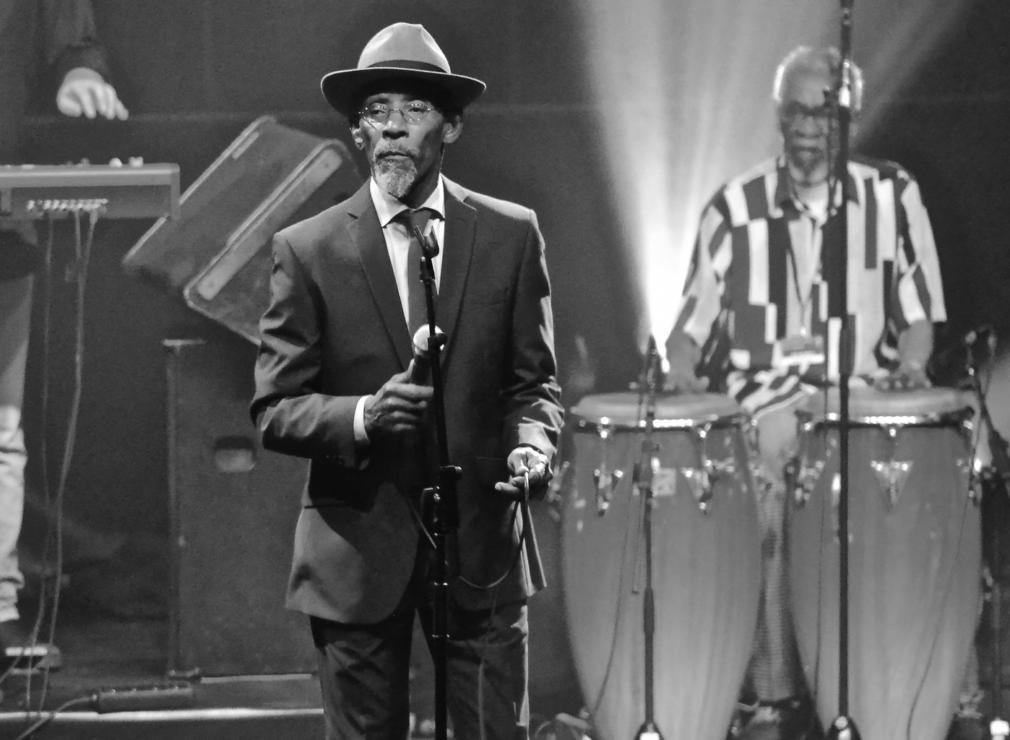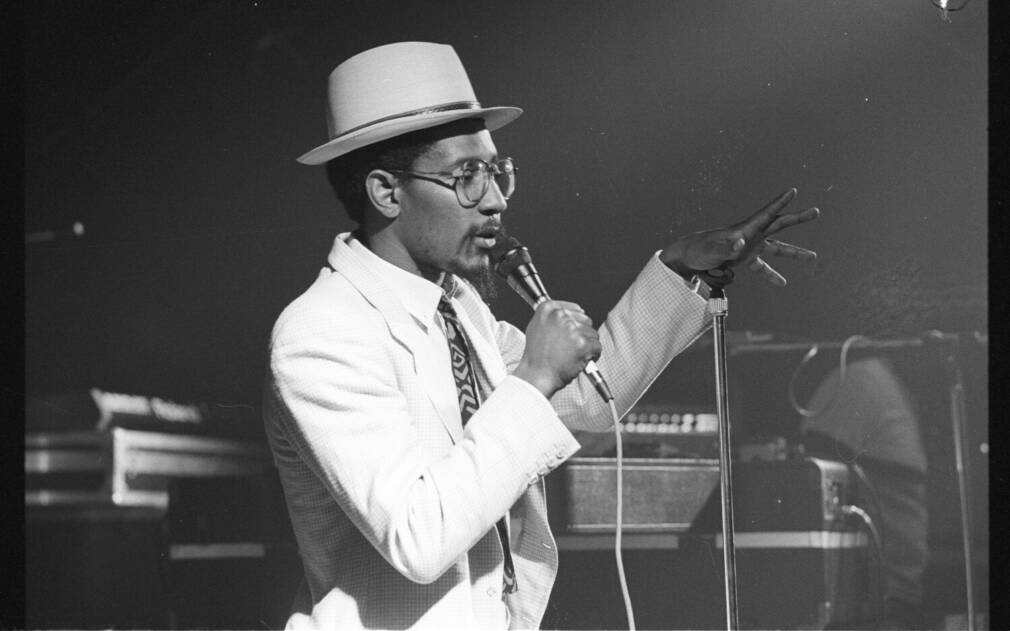With his trilby hat and goatee, Linton Kwesi Johnson’s silhouette is as iconic as his baritone voice. From his London home in Brixton, where he is simply known as “poet”, to Coachella – Johnson or LKJ as he’s affectionately known, has performed his verse to generations of fans and is widely credited as the father of dub poetry.The first spoken word artist to give voice to the children of Windrush (the second generation of the Caribbean diaspora) LKJ cleared the way for the likes of Benjamin Zephaniah, Lemn Sissay and Akala and for a time was the only living poet (and the first Black poet) to be published in the esteemed Penguin Modern Classics series. The first stanza of his story begins in rural Jamaica in 1952 and the town of Chapelton where he was raised by his grandmother after his parents separated and the first literature the young Linton encountered was the Bible, where he met written verse for the first time.
Leaving Jamaica in 1963 he was reunited with his mother in London and was shocked by the hostility he encountered in England, and not just from cartoonish racists such as The National Front, but from teachers in school. Studying sociology at Goldsmiths university, he discovered writers such as Aimé Césaire and Léopold Senghor and attended Black Panther meetings – taking the name Kwesi (the Akan name for born on a Sunday) and around the same time began composing poetry.
It was whilst dabbling in music journalism and writing record sleeve notes for Virgin Records that he connected with Barbados born producer and multi-instrumentalist Dennis Bovell (writer of the classic “Silly Games”) and together in 1978 they released Linton’s debut album Dread Beat an’ Blood from where the 1st of our five dubs “All Wi Doin’ Is Defendin” comes.
A meditation on the pressure felt by Black youth in the inner city “All Wi Doin’ Is Defendin'”, is propelled forward by a rockers drum riddim over which Johnson “toasts” or chats his verse answered by unsettling keyboard riffs. The poem predicts the Brixton riots that came a few years later, documenting the growing resentment felt by the youth towards the police:
Doze days
of di truncheon
An doze nites
of melancholy locked in a cell
Before concluding that such days are “well numbered”.
“All Wi Doin’ Is Defendin'” by Linton Kwesi Johnson
Police brutality is also the subject of “Sonny’s Lettah” from Linton’s second album Forces of Victory released in 1979. The speaker of “Sonny’s Lettah (Anti Sus poem)” begins with their address of writing (Brixton Prison SW2) and it’s the racist SUS laws, stop and search laws used to criminalise Black Britons, that provide the catalyst for the tragedy related in this epistle from a son to his mother:
Mama, I really doun know how to tell ya dis
For I did mek a solemn promise
To tek care a lickle Jim
And try mi best fi look out fi him
“Sonny’s Lettah (Anti Sus poem)” by Linton Kwesi Johnson
The speaker prefaces before detailing a violent assault at the hands of the police. On a side note the harmonica which wails like a siren on Sonny’s Lettah is played by non other than Dreadful Julio (Julio Finn) – a side man for Archie Shepp. Forces of Victory also features the late Emmanuel “Rico” Rodriguez the Cuban born trombone player who trained at the legendary Alpha Boys School (the convent conservatoire for many of Jamaica’s greatest instrumentalists). Forces of Victory also notably features the late Emmanuel “Rico” Rodriguez the Cuban born trombone player who trained at the legendary Alpha Boys School (the convent conservatoire for many of Jamaica’s greatest instrumentalists).

Our next two poems come from Bass Culture released in 1980. A meditation on the viscerality of reggae, the title track “Bass Culture” evokes the skank of guitar and rumble of bass, employing all the phonetic richness of what the Bajan writer Kamau Brathwaite named “nation language” in opposition to the pejorative connotations of “patois” to describe Jamaican English.
All tensed up
In di bubble an di bounce
When di beat jus lash
When di wall mus smash
“Bass Culture” by Linton Kwesi Johnson
Meanwhile in “Inglan Is A Bitch” Linton holds space / bears witness for those 1st generation Jamaicans who hustled to find graft in: “Landan toun” where they found varied jobs like “pan di andahgroun.” A commentary on the austerity of Margaret Thatcher’s Britain, Bovell’s dubscape features production tricks such as reverb, filters, and gates as Linton narrates:
Well mi dhu day wok an’ mi dhu nite wok
Mi dhu clean wok an’ mi dhu dutty wok
“Inglan Is A Bitch” by Linton Kwesi Johnson
before concluding: “Inglan is a bitch, dere’s no escapin it.” Linton performed the poem without a band on the classic British television programme The Old Grey Whistle Test in 1980.
Launching his own record label LKJ Records in 1981 to release fellow poets such as the late Jean “Binta Breeze” Linton continued to release music on Chris Blackwell’s Island Records including Making History in 1984 from which our final poem “Wat About Di Working Claas?” is taken. With a crisp brass arrangement, vibey hammond organ and bluesy guitar licks “Wat About Di Working Claas?” is an expression of Linton’s lifelong commitment to “sowshallism” through witty political observation:
From Inglan to Poland
Every step across di ocean
Di ruling claases dem in a mess, oh yes
Di capitalist system are regress
“Wat About Di Working Claas” by Linton Kwesi Johnson
Whether accompanied by a band or speaking his truth acapella, there is always a bass line in LKJ’s poetry, a sharpness to his pen and a reverberation in his mic. To borrow a phrase from one of his own poems, Linton Kwesi Johnson is a “tap natch poet” and a living legend we feel compelled to celebrate.


